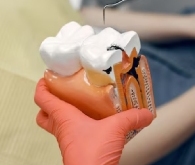
Best Dental Implants Clinic in Newtown, Kolkata
What are Dental Implants?
Dental Implant Treatment Procedure
⦿ Have a fully developed jawbone
⦿ Possess enough bone to support the implants or are open to a bone graft
⦿ Have healthy oral tissues
⦿ Do not have health conditions that could impair bone healing
⦿ Are unable or prefer not to use dentures
⦿ Wish to enhance your speech
⦿ Are prepared for a treatment process that may take several months
How to Prepare for Dental Implants?

Comprehensive Dental Exam
This may involve dental X-rays, 3D imaging, and creating models of your teeth and jaw.

Medical History Review
Provide the doctor with details about your medical conditions and all medications, including prescription, over-the-counter drugs, and supplements. In case you have certain heart conditions or orthopaedic implants, the doctor may prescribe antibiotics to prevent infection.

Treatment Plan
A customised plan based on the number of teeth to be replaced and the condition of your jawbone and remaining teeth will be generated by the specialist.
Regarding pain management, anaesthesia options include local anaesthesia, sedation, or general anaesthesia. Discuss with the dental specialist to determine the best option for you. Follow the dental care team’s instructions on eating and drinking before the treatment based on your anaesthesia type. If you are receiving sedation or general anaesthesia, arrange for someone who will be able to drive you home post-treatment and plan to rest for the remainder of the day.
What to Expect from Dental Implant Treatment?

Tooth Extraction
Removal of any damaged or decayed tooth.

Jawbone Preparation (If Needed)
Bone grafting may be required if your jawbone is insufficiently thick or too soft to support the implant.

Dental Implant Placement
Insertion of the metal post into the jawbone, which serves as the new tooth root.

Bone Growth and Healing
The jawbone integrates with the implant over several months, a process known as osseointegration.

Abutment Placement
A connector piece is attached to the implant to hold the artificial tooth.

Artificial Tooth Placement
Placement of the final crown or artificial tooth.
Timings
 Monday : 10am to 8:00pm
Monday : 10am to 8:00pm
 Wednesday : 10am to 8:00pm
Wednesday : 10am to 8:00pm
 Friday : 10am to 8:00pm
Friday : 10am to 8:00pm
 Sunday : 10am to 8:00pm
Sunday : 10am to 8:00pm
 Tuesday : 10am to 8:00pm
Tuesday : 10am to 8:00pm
 Thursday : 10am to 8:00pm
Thursday : 10am to 8:00pm
 Saturday : 10am to 8:00pm
Saturday : 10am to 8:00pm
Locations
Let Us Get Back to You!!
What are the Benefits of Dental Implants?
⦿ Durability: They are strong and durable.
⦿ Bone Preservation: Implants help maintain jawbone density.
⦿ Functionality: Dental implant designs help restore the ability to eat and speak properly.
⦿ Comfort: They eliminate the discomfort of removable dentures.
Take Care of Dental Implants

Maintain Excellent Oral Hygiene
Just as with natural teeth, it’s important to keep your implants, artificial teeth, and gum tissue clean. Use specially designed brushes, like interdental brushes, to reach the tight spaces between your teeth, gums, and metal posts.

Visit the Dentist Regularly
Schedule routine checkups to monitor the health and function of your dental implants with crowns and adhere to recommendations for professional cleanings.

Avoid Habits that can Cause Damage
Refrain from chewing hard items, such as ice or hard candy, which could potentially damage your crowns or natural teeth. Additionally, avoid tobacco and caffeinated products that can stain your teeth. If you grind your teeth, seek treatment to prevent damage.

